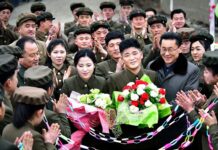It is still unsure if the U.S.’ removing North Korea from the list of state sponsors of terrorism can cause effectively the nuclear disarmament. There is a possibility that the Bush administration, which decided to delist North Korea from its terrorism sponsoring list only 20 days ahead of the Presidential Election, may face aftereffects.
Spokesman of the U.S. Department of State Sean McCormack said on the 11th, “Every element of verification that we sought is included in this package.” This agreement which was made by U.S. Assistant Secretary of State Christopher Hill who visited Pyongyang for four days last week and North Korean Minister of the Foreign Affairs, was acknowledged ultimately by President Bush.
According to the initial agreement of the Six Party Talks, after North Korea submits the declaration of its nuclear program in the second phase of the North Korean nuclear disablement, the U.S. was supposed to remove North Korea from the terrorism sponsoring list in 45 days. However, removing the North from the list was delayed due to discord between the U.S. and North Korea regarding the verification protocol, although North Korea submitted the declaration to China in July.
North Korea has tried to restore its measure to disable the Yongbyon facilities since August while claiming that the U.S. did not follow the “action for action” principle and the U.S. eventually opted for “removing North Korea from the list of the terrorism sponsoring states” and “resuming the disablement process” in order to prevent the situation from escalating.
The Six Party Talks will be held this month to ratify the nuclear verification agreement between the U.S. and North Korea and the second phase of the nuclear disablement process currently locked in a stalemate may be completed.
◆ Removing the North from the list, whose advantage is it?
A criticism was raised that the Bush lame duck administration in trying to establish a more possitive record on the North Korea nuclear issue has been overly forgiving and made a lopsided concession.
Senior researcher of the Korea Institute for National Unification Jeon Sung Hoon criticized bitterly that “The U.S. has not given way to the North, but has thrown away its principles. This agreement was merely a political negotiation only to record a political result.”
“Obama as well as Senator McCain did not welcome the decision. In the short term, it is an advantage for an individual, George W. Bush, but in the long run, it may leave side effects to the U.S.,” he predicted.
Researcher of the Sejong Institute Song Dae Sung pointed out that “The Bush administration wants to say it will wrap up the second phase of the North Korean nuclear disablement, but in practical it would be an unfinished completion. Now, the U.S. could not lead a practical nuclear disarmament anymore through a political discussion between the U.S. and North Korea.”
Professor of North Korean Studies at Korea University Yoo Ho Yul asserted that “It was not completely a loss because the U.S. could put pressure over North Korea with a new different card. Japanese or the U.S. conservatives’ confidence in the U.S. leadership can be damaged.”
Experts have generally noted that the benefits for North Korea are great.
Researcher Jeon predicted that “President Bush may send a wrong sign to the North as he gave up the principles. At the same time, North Korea can gain self-confidence in negotiations with the U.S. and purchase a good opportunity to strengthen the foundation of leadership.”
Professosr Yoo released a similar evaluation on North Korea’s benefits, saying that “Subsequently, North Korea’s pressure was effective anyhow. A move to resume another nuclear experiment seemed to be a sort of North Korean scenario to press the U.S. North Korea’s threat to resume the disablement process has obtained an excellent result.”
◆ Resuming the disablement of North Korean nuclear program
Although the agreement includes verification over the Uranium Enrichment Program and nuclear proliferation as well as over the amount of plutonium that North Korea has extracted, regarding undeclared nuclear facilities, the two countries stipulated that they will verify them under a mutual agreement. There will inevitably be controversial criticisms during an upcoming verification process.
Director of Studies at the Council on Foreign Relations Gary Samore was quoted in the New York Times on the 11th, that “Every agreement you ever have with the North Koreans always contains certain ambiguities, and that ends up being the basis for which you have the next round of talks…. It’s always two steps forward and one step back.”
John Bolton, the former United States ambassador to the U.N., also criticized that “This [agreement] means that North Korea has a veto over everything beyond Yongbyon,” he said, “so that’s a clear victory for North Korea.”
However, Professor Yoo predicted optimistically that “The second phase of measures would be completed at least by the end of the Bush administration this year. The Six Party Talks will be resume, the verification process will be ratified and step-by-step approach will be negotiated.”
Researcher Song emphasized that “For the time being, North Korea will take a sincere posture for the nuclear disarmament negotiations, but when entering into the third phase, there will be several roadblocks. North Korea has been expressing not North Korean denuclearization but peninsualar denuclearization. Therefore, barriers could surface during the upcoming nuclear disarmament process.”
“For around a year, they would play a tug of war on the verification without any progress, and new problems will be revealed when a new U.S. administration reorganizes its policy on North Korea. During that time, North Korea could conduct military provocations to tense in military,” researcher Jeon viewed.




















